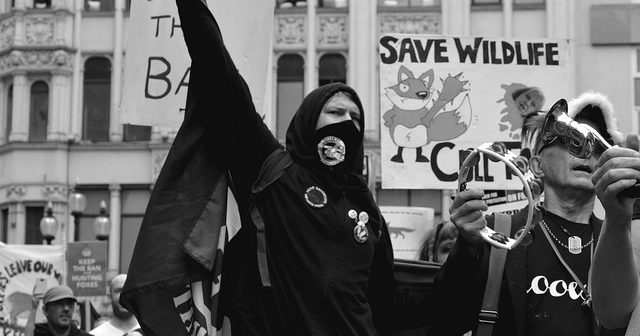According to the Collins Dictionary, an extremist is someone “who favours or resorts to immoderate, uncompromising, or fanatical methods or behaviour.” Usually, extremists of any persuasion are marginalized, garnering attention only when deemed dangerous. Animal advocates, or more specifically, those calling for an end to (all) animal exploitation, are often labeled extremists and treated accordingly. Here, the history of another great movement is instructive. From Martin Luther King Jr’s “Letter From Birmingham Jail” (1963):
“But though I was initially disappointed at being categorized as an extremist, as I continued to think about the matter I gradually gained a measure of satisfaction from the label. Was not Jesus an extremist … and Abraham Lincoln … and Thomas Jefferson … ? So the question is not whether we will be extremists, but what kind of extremists we will be. Will we be extremists for hate or for love? Will we be extremists for the preservation of injustice or for the extension of justice?”
The animal rights movement holds the following as incontrovertible facts: First, virtually all the ways humans use other species—for entertainment, for fashion, for pets, for food, for research—involve sentient beings, or those capable of suffering. Second, suffering of some kind, be it physical or psychological, is inherent in the exploitation of those beings. Third, none of these uses are necessary for human survival. On this, the first three—a day at the horsetrack, a flash of fur, surrogate companionship—need not be argued, and vegans have flourished long enough to disprove the essentiality of animal protein.
Because of the supposed gravity involved, the argument against the necessity of animal experimentation proves a bit more challenging. But is it, as most people believe, an unfortunate Darwinian necessity in the war on human ills? According to the American Anti-Vivisection Society, “Animal studies do not reliably predict human outcomes; nine out of ten drugs that appear promising in animal studies go on to fail in human clinical trials; reliance on animal experimentation can impede and delay discovery [such as with research on the health effects of tobacco and the development of the polio vaccine]; and animal studies are flawed by design.” Besides, viable options abound. We test on animals because we always have, and because we can, not because we must.
Many sources explore more in depth the failures of animal experimentation, and include calls from within the scientific and medical community to end it, such as “Medical Doctors and Scientists Against Vivisection,” “Doctors Against Vivisection,” “Doctors Against Animal Experiments,” “The Experiment Is on Us,” and “Taking Lab Rats Seriously.”
Dr. Richard Ryder, the psychologist who coined the term speciesism, once wrote, “Pain [suffering] is the one and only true evil,” and “pain is pain regardless of its host.” And so, the logic irrepressibly flows: The willful and unnecessary infliction of this evil on our animal brethren is, if the phrase is to have any meaning, morally indefensible. If enslaving, raping, torturing, and murdering humans is wrong, then why should doing the same to animals, many of whom are more intelligent and sensitive than some of us, be viewed differently? We are not wading through murky waters here.
In light of the above points, moderation is untenable. The lab monkey, fur mink, and racing horse will not be liberated through compromise. They need so-called extremism. As Dr. King suggested, an extremist for justice is a label that carries no shame; indeed, it should be embraced. I close with a particularly relevant excerpt from the inaugural edition of William Lloyd Garrison’s The Liberator, a 19th century anti-slavery newspaper:
“I am aware that many object to the severity of my language; but is there not cause for severity? I will be as harsh as truth, and as uncompromising as justice. On this subject, I do not wish to think, or to speak, or write, with moderation. No! No! Tell a man whose house is on fire to give a moderate alarm; tell him to moderately rescue his wife from the hands of the ravisher; tell the mother to gradually extricate her babe from the fire into which it has fallen—but urge me not to use moderation in a cause like the present. I am in earnest—I will not equivocate—I will not excuse—I will not retreat a single inch—AND I WILL BE HEARD.”
Featured image: Activists at a London protest against fox hunting. Some would label this extremism, but is it not an appropriate position and response to the unnecessary killing of sentient beings? Image credit EYE DJ, CC BY-SA 3.0.





